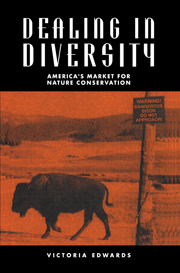Book contents
- Frontmatter
- Contents
- Preface
- Acknowledgments
- 1 Introduction: private provision of conservation
- 2 The conservation market
- 3 Collective action
- 4 Protection mechanisms and incentives
- 5 Fee-hunting
- 6 Watchable wildlife
- 7 Turning development into conservation
- 8 Conservation partners
- 9 Towards a more holistic approach
- References
- Index
7 - Turning development into conservation
Published online by Cambridge University Press: 19 January 2010
- Frontmatter
- Contents
- Preface
- Acknowledgments
- 1 Introduction: private provision of conservation
- 2 The conservation market
- 3 Collective action
- 4 Protection mechanisms and incentives
- 5 Fee-hunting
- 6 Watchable wildlife
- 7 Turning development into conservation
- 8 Conservation partners
- 9 Towards a more holistic approach
- References
- Index
Summary
Land-use ethics are still governed wholly by economic self-interest, just as social ethics were a century ago.
Aldo Leopold (The Land Ethic)Introduction
Chapters 5 and 6 examined how landowners might derive additional income from natural areas by charging for public access and use of their land. By harnessing the private ‘use’ benefits to be gained from natural areas, a whole host of fee-paying enterprises can create a market for conservation without the need for the land ownership to change hands. A more sophisticated range of property rights is developed, which extends transfer beyond that of freehold fee-simple. Both chapters illustrated how additional income, derived from such practice, acts as an important incentive in encouraging landowners to protect natural habitat.
This chapter examines how the use and nonuse benefits of owning and living in a conservation area might be exploited to facilitate the protection of natural areas. Rather than providing an additional income source from the natural area, the benefits of conservation are capitalized into the freehold value of a site. Careful use of protection mechanisms ensures that the area is legally protected in perpetuity. In practice the powerful incentive of private landownership, often coupled with the ability to reside in the area, ensures that the protection of the natural area is continuously enforced.
Conservation real estate
In developed countries, one of the greatest threats to natural areas and wildlife management must be that posed by the construction of buildings, roads and engineering works.
- Type
- Chapter
- Information
- Dealing in DiversityAmerica's Market for Nature Conservation, pp. 120 - 139Publisher: Cambridge University PressPrint publication year: 1995



